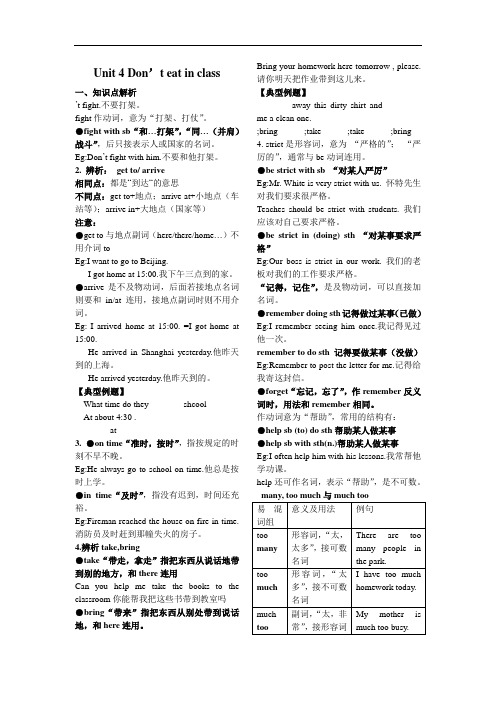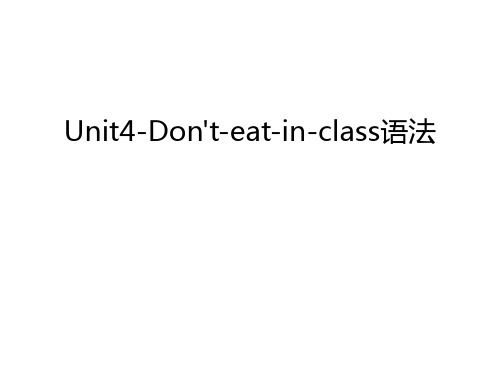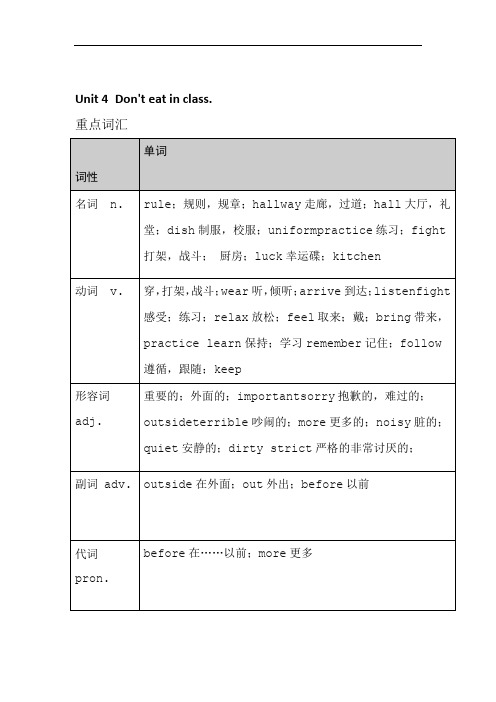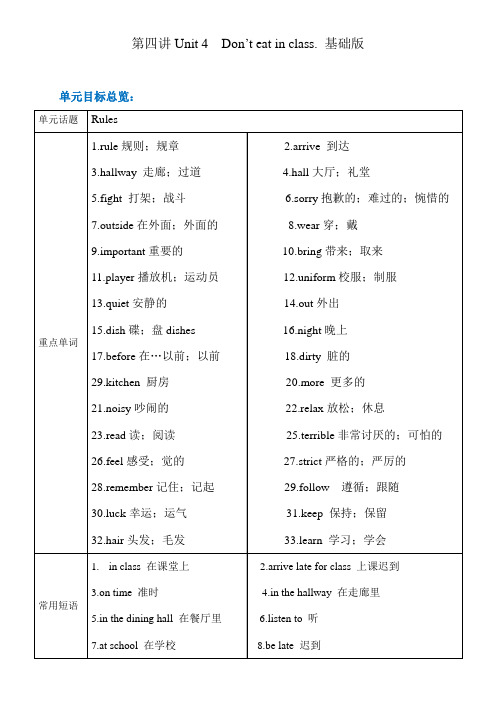Unit4-don't eat in class知识点含练习
Unit_4_Don27t_eat_in_class知识点解析及练习题

Unit 4 Don’t eat in class一、知识点解析’t fight.不要打架。
fight作动词,意为“打架、打仗”。
●fight with sb“和…打架”,“同…(并肩)战斗”,后只接表示人或国家的名词。
Eg:Don’t fight with him.不要和他打架。
2. 辨析:get to/ arrive相同点:都是“到达“的意思不同点:get to+地点;arrive at+小地点(车站等);arrive in+大地点(国家等)注意:●get to与地点副词(here/there/home…)不用介词toEg:I want to go to Beijing.I got home at 15:00.我下午三点到的家。
●arrive是不及物动词,后面若接地点名词则要和in/at连用,接地点副词时则不用介词。
Eg: I arrived home at 15:00. =I got home at 15:00.He arrived in Shanghai yesterday.他昨天到的上海。
He arrived yesterday.他昨天到的。
【典型例题】---What time do they________shcool---At about 4:30 .at3. ●on time“准时,按时”,指按规定的时刻不早不晚。
Eg:He always go to school on time.他总是按时上学。
●in time“及时”,指没有迟到,时间还充裕。
Eg:Fireman reached the house on fire in time.消防员及时赶到那幢失火的房子。
4.辨析take,bring●take“带走,拿走”指把东西从说话地带到别的地方,和there连用Can you help me take the books to the classroom你能帮我把这些书带到教室吗●bring“带来”指把东西从别处带到说话地,和here连用。
Unit4-Don't-eat-in-class语法讲解学习

肯定形式:
Do型 来这儿 关门儿
动词原形+(宾语) +其他成分
Come here. C l o s e t h e
door.
肯定形式:
Be型
安静 小心 快点儿
Be+表语(名词或 形容词)+其他成 分
Be quiet. Be careful. Be quick.
classroom. 4. Don't watch TV after school.
否定形式:
L e t 型 的 否 定 1.Don't let
式有两种: +宾语+动词原
形+其他
2 . L e t + 宾 语
+not+动词原
形+其他
否定形式:
1.Don't let him
不 要 让 他 打 排 play volleyball.
Conclusion
1. 祈使句:Do型 Be型 Let型 否定形式和肯定形式,其中Let
型有两种否定形式。 2.Must/have to 两者的区别与否定形式
此课件下载可自行编辑修改,仅供参考! 感谢您的支持,我们努力做得更好!谢谢
Don't构成。 不要安静。
Don't be quiet.
Exercises
不要在教室里听音乐 不要在教室里做作业 不要在教室里戴帽子 不要在放学之后看电视
Exercises
1. Don't listen to music in class. 2. Don't do homework in class. 3 . Don't wear hats in t he
人教版 Unit 4 Don't eat in class知识点 + 练习讲义设计(无答案)

You________ ________do your homework every day. 4.He has to get up before 6:10 every morning.( 改为一般疑问句,并作肯定回答 ) —________he________ ________get up before 6:10 every morning? —________,he________. 5.They have to wash their hands before meals.( 对画线部分提问 ) ________ ________they________ ________ ________before meals?
~ to do sth . 记得去做某事 ~ dI never have any fun. (never 译为“从来没有”,表示否定,否定句中表示“任何,一些”,用 any)
13. 表示“时间”的词组: (1) 下课后:after class 放学后:after school (2) 在上学的白天/晚上:on school days/nights 比较:at night
3. You don't ______wash all the plates after meals.
A.have to B.must C,may
D.has to
5.---Must I clean the window now?
---No,you_______.
A.musn’t B.needn’t C.can’t 四、按要求完成句子,每空一词 1.Mike has to clean his bedroom at home.( 改为否定句 ) Mike________ ________ ________clean his bedroom at home. 2.You must do your homework every day.( 改为同义句 )
人教版七级下英语Unit 4 Dont eat in class单元知识复习总结

Unit 4Don't eat in class. 重点词汇重点短语Section A1.in class在课堂上2.arrive late for class=be late for class上课迟到3.on time准时4.in the hallways在走廊里5.in the dining hall在餐厅里6.listen to听7.at school在学校8.be late迟到9.music player音乐播放器10.bring...to school 把……带到学校来不得不做have to do.11.12.wear a school uniform穿校服13.be quiet安静Section B14.go out外出15.on school nights在上学期间的晚上16.practice the guitar练吉他17.do the dishes清洗餐具18.make breakfast做早饭19.make one's bed整理床铺20.leave sth.in...把……丢在……里21.read a book看书22.think about考虑23.make rules制订规则24.follow the rules遵守规则25.Good luck!祝好运!26.keep sth.+adj.使……保持……状态重点句型1.Don't eat in class.在课堂上不准吃东西。
2.Don't arrive late for class.You must be on time.不准上课迟到,务必守时。
3.Don't run in the hallways.不准在走廊内乱跑。
4.Don't eat in the classroom.You must in the dining hall.不准在教室里吃东西,务必在餐厅里吃东西。
5.Don't listen to music in class.不准在课堂上听音乐。
初中英语人教版七年级下册Unit 4 Don’t eat in class知识点整理

七年级英语下册Unit4知识点【Useful expressions】1.No talking 不许讲话 (No+动词ing,禁止......)2.the school rules 校规3.eat in class 上课吃东西4.run in the hallways 在过道上追逐打闹5.in the dining hall 在食堂6.fight with sb.=have a fight with sb.和某人打架7.go out on school nights 在上学期间的晚上外出8.on school days 在上学的日子9.arrive late for class= be late for class 上课迟到了10.wear a/the uniform 穿制服11.have to 不得不;必须12.eat outside 外面吃东西13.practice doing sth.练习做某事14.help mom make breakfast 帮助妈妈做早饭17.too many 太多(+可数复数)18.too much 太多(+不可数)19.so many 如此,这么多的(+可数名词复数)20.so much 如此,这么多的(+不可数名词)21.library rules 图书馆规则22.be strict with sb.in sth.在某方面对某人严格23.be quiet 安静24.be noisy 吵闹25.make the teacher unhappy 惹老师不高兴26.make a noise/make noises 制造噪音27.do the dishes 洗碗28.stay at home呆在家里29.on time 准时30.in time 及时31.learn to do sth.学习做某事32.learn from sb.向某人学习33.follow / keep /obey the rules 遵守规定34.break the rules 破坏规则35.make rules 制定规则36.keep one’s hair short 留短发37.think about 考虑38.make one’s bed 铺床39.in your home 在你家40.at home 在家41.Good luck to you! 祝你好运42.remember doing sth.记得做过某事43.remember to do sth 记得去做某事44.listen to sb.听某人说【Target sentences】1.--What are the rules?--Well, you must be on time for class.Don't fight with your classmates.2.We can’t listen to music in the classroom or hallways.3.--Can we bring music players to school?--Yes, we can./No, we can’t.4.And we always have to wear the school uniform.5.--Does he have to wear a uniform at school?--Yes, he does./No, he doesn't.6.--What do you have to do?--We have to be quiet in the library.7.Don't leave the dirty dishes in the kitchen.8.My dad says I can’t play basketball after school because I must do my homework.9.After dinner, I can’t relax,either.I must read a book before I can watch TV.10.I know how you feel.11.There are a lot of things you can do.12.Parents and schools are sometimes strict but remember, they make rules to help us.13.I think it’s best to follow the rules.14.I can’t go out on school nights.15.I have to do my homework after school.16.I must practice the guitar before dinner.【Language points】1.Don’t arrive late for class.(1)arrive v.到达;是不及物动词,若接地点名词,要加介词in或at。
人教版英语七年级下册-Unit-4-Don't-eat-in-class-语法解析

2021/2/4
1
6
疑问句: must 提前,回答时注意一二人称的互换。肯定用 must, 否定用needn’t. e.g. --Must I go home now?
-- Yes, you must. -- No, you needn’t.
B: And I must clean my room every Saturday. =?
A: Wow, you do have a lot of rules!
2021Dr. Know, There are too many rules! At 6:00 a.m. my mom says, “Get up now and make your bed!”
too many rules “太多的规定”, 其中too many 用来 修饰可数名词复数rules。 e.g. He has too many friends to meet.
修饰不可数名词时, 要用too much e.g. We have too much work to do.
much too 太……much 用来增强语气。后接形容 词或副词。
What can I do. Dr. Know? Molly Brown, New York
表“看”的单词?
either 也。用于否定句和疑问句中。肯定句中用too 表也。
watch,see,look r,read
2021/2/4
1
13
Dear Molly, I know how you feel. People always tell us, “ Don’t do this!” or “You can’t do that!” But think about it, Molly. There are a lot of things you can do. You can play basketball on weekends. You can watch TV after you read a book. Parents and schools are sometimes strict,
Unit 4 Don't eat in class.语法、练习题及答案

Unit 4 Don’t eat in class.一、祈使句祈使句指的是表示命令、请求、建议或劝告的句子。
其主语you常省略,谓语动词用原形,句末用感叹号或句号,读降调。
1. 肯定的祈使句(1)动词原形+其他Stand up, please. = Please stand up. 请起立。
(2)Be + n./adj.Be a good boy! 要做一个好孩子!Be careful! = Look out! = Take care! 小心/ 当心!(3)Let + 宾语+ 动词原形+ 其它成分Let me help you. 让我来帮你。
Let’s go to school together. 咱们一起上学去吧。
2. 否定的祈使句(1)Don't + 动词原形Don't stand up. 别站起来。
Don't be careless. 别粗心。
Don't let them play with fire. 别让他们玩火。
(2)Let型的否定式有两种:“Don't + let + 宾语+ 动词原形+ 其它成分”和“Let + 宾语+ not + 动词原形+ 其它成分”。
Don't let him go. / Let him not go. 别让他走。
Let them not play with fire. 别让他们玩火。
(3)no开头,用来表示禁止性的祈使句。
No smoking! 禁止吸烟!No fishing! 禁止钓鱼!3. 祈使句的强调形式,通常在肯定祈使句式前加上助动词Do。
例如:Do shut up! 快住口!4. 祈使句的回答祈使句的动作通常是表示将来发生的动作,所以回答祈使句时,一般用will或won’t。
在回答具有否定意义的祈使句时,要注意两点:(1)形式一致(即Yes与will保持一致;No与won’t保持一致)(2)意思相反(即Yes是“不”的意思;No是“是”的意思)。
人教版英语七年级下册Unit4Don’teatinclass.知识点及课后作业

第四讲Unit 4 Don’t eat in class. 基础版单元目标总览:【知识点详解】1、Don’t arrive late for class.上课不要迟到。
1)arrive 意为“到达”。
arrive at+小地点,arrive in +大地点。
◆I will arrive in Beijing next week. 我下周到北京。
◆I arrived at the small village on a cold morning. 在一个寒冷的早晨我到达了那个小村庄。
2)arrive 后面跟地点副词here, there, home时,不需要跟介词。
◆arrive home 到家arrive here 到这儿2、You must be on time.你必须准时。
(1)on time&in timeon time 意为“按时,准时”,指按照规定的时间或者指定的时间做某事;而in time指“及时”,指不迟到或在规定的时间之前或者接近所规定的时间做某事。
◆We must arrive there on time. 我们必须按时到达那里。
At last, the police arrived there in time. 最后警察及时赶到了那里。
(2)must情态动词,意为“必须”,不能单独做谓语,必须和动词原形以其构成谓语;其后接动词原形;其否定形式mustn’t意为“禁止,千万不要”◆I must do my homework before dinner.晚饭前我必须做完作业。
3、Don’t listen to music in class.不要再课堂上听音乐。
(1)listen 是不及物动词,意为“听,倾听”,强调听的动作,后面接宾语时要加上介词to。
◆We should listen to the teacher carefully. 我们应该认真听老师讲课。
◆Listen! Someone is singing in the garden. 听! 有人在花园里唱歌。
- 1、下载文档前请自行甄别文档内容的完整性,平台不提供额外的编辑、内容补充、找答案等附加服务。
- 2、"仅部分预览"的文档,不可在线预览部分如存在完整性等问题,可反馈申请退款(可完整预览的文档不适用该条件!)。
- 3、如文档侵犯您的权益,请联系客服反馈,我们会尽快为您处理(人工客服工作时间:9:00-18:30)。
Unit4 Don’t eat in class一、重点词组及短语:1.school rules 学校规章制度2.break(fallow/keep)the rules 违反(遵守)规章制度3. arrive late for class = be late for class 上课迟到4.dining hall饭厅,餐厅5. in class 在课堂上6.on time准时(in time及时)7. eat in the classroom 在教室里吃东西8.. wear a hat (hats) 戴帽子9.. listen to…听…10.school uniforms校服11. wear uniforms穿制服12.I see我明白了13. have to do 不得不做14.be(keep)quiet保持安静15.according to根据,依据16.make (up)rules 制订规则17.share (sth )with sb 和某人分享(…)18. on school days在上学期间19. on school nights在校期间的晚上20. practice (playing) the piano 练习弹钢琴21.go out外出22.see friends看望朋友23.clean (one’s) room打扫房间24.do the dishes洗餐具25. too many/much太多的(可数/不可数)26.make (one’s) bed铺床27.go to bed去睡觉(be in bed 在床上)28.think about (sb/sth/doing sth)考虑(某人/某物/做某事)29.be strict (with sb)对某人)要求严格30.learn to do sth学(做某事)31. Don't talk. = No talking.不要说话。
二、重点句型:1. Don’t arrive late for class. You must be on time.●get to/reach/arrive 到达不同点:get to+地点;reach+地点arrive at+小地点(车站等);arrive in+大地点(国家等)注意:get to/ arrive与地点副词(here/there/home…)不用介词toEg: ①I arrived home at 15:00. =I got home at 15:00.=I reach home at 15:00.②He arrived in Shanghai yesterday.=He got to Shanghai yesterday=He reached Shanghai yesterday③He arrived yesterday.●arrive late for= be late for●on time“准时,按时”,指按规定的时刻不早不晚。
in time“及时”,指没有迟到,时间还充裕。
2. Don’t listen to music in class.hear、listen和sound都有"听"的意思,但三者是有区别的:①hear"听说""听"的内容。
Eg:I'm sorry to hear that you are ill.②listen"听"侧重于"听"这一动作。
Listen to music/the radio 听音乐/广播Eg:Listen to me carefully.③sound"听起来"Eg:That sounds great. / It sounds like fun.3.Don’t fight.fight作动词,意为“打架、打仗”。
其过去式为fought.●fight for“为…而斗争”,后面常接抽象名词,表示为事业、自由等而斗争。
Eg:They are fighting for freedom.●fight against“为反对…而战斗”,后接事物名词、人和国家名词。
Eg: They fought against the enemy. 他们和敌人作战。
●fight with“和…打架”,“同…(并肩)战斗”,后只接表示人或国家的名词。
Eg:Don’t fight with him.4. Ms./Mrs./Miss.●Ms.:“女士”,用于婚姻状况不明或不想区分婚否的女子的姓前。
●Mrs.:“夫人”,用于已婚女子姓前。
Madam:也用于已婚女子,意为“夫人、女士”,一般单独使用,不与姓连用●Miss.:“小姐”用于未婚女子姓前,还常用于年轻的女教师的姓前,可译为“老师”。
5.Can we wear a hat in class?Wear表示状态= be in;后面可以跟衣服、鞋子、帽子、眼镜6. Can we bring music players to school?●bring“带来”指把东西从别处带到说话地。
bring hereEg:Bring your homework here tomorrow,please.●take“带走,拿走”指把东西从说话地带到别的地方。
take thereEg:Can you help me to take the books to the classroom?bring/take...to... 把某物带到某地【例题】________away this dirty shirt and ________me a clean one.A.Take;bringB.Take;takeC.Bring;takeD.Bring;bring7. practice the guitar/play the guitar(西洋乐器前加定冠词the)①作v. 后接名词、代词、动名词(即doing)。
②作n. 练习,一般情况不可数,但是:do morning exercises8.注意时间前面的介词(P22)On school nights at night 在晚上On school days in the day 在白天9.There are too many rules!①回顾there be与have的区别:There be表示某个地方“存在”某物或某人;而have表示主语“拥有”某人或某物。
但如果表示部分与整体的关系时,there be与have(has)这两种表达方式可以互换:A week has seven days.= There are seven days in a week.②too many,too much与much too的区别:意义及用法例句too many adj.“太,太多”,接可数名词There are too mang people in thepark.too much adj.“太多”,接不可数名词I have too much homeworktoday.My mother is much too busy.much too adv.“太,非常”,接形容词或副词【例题】I have ________skirts and this one is ________large for me,so you can take it if you like. A. too many; too much B. too much; much too C. too many; much too10.Don’t leave the dirty dishes in the kitchen!Leave在此处译为“遗弃”用法:leave sth. sp.当leave sth sp. 还可以译为“把某物忘在某地”,注意leave此时不可以改成forget。
11.After dinner, I can’t relax either.①either此处译为“也”,注意三个“也”的用法区别:either, too与also意义及用法例句either ―也‖,用于否定句中,置于句末时用I won’t go there,either.too ―也‖,用于肯定句句末,用“,”隔开I like dancing,too.also ―也‖,用于肯定句句中,置于实义动词前I also like English.②relax 放松relax oneself. relax relaxed relaxing12.I must read a book before I can watch TV.①read a book=do some doing②注意区分四个“看”:watch 观看(活动的画面,足球,TV, 比赛)look at 看…(强调看的动作,不一定看见)see 看见看到(强调看的结果)read 看(书、报)13. I know how you feel.(回顾unit3的宾语从句,注意从句要使用陈述语序)14.Parents and schools are sometimes strict, but remember, they make rules to help us. sometimes ---------- 有时,时常,时而some time -------- 一段时间some times -------- 好几次,好几倍sometime--------- (在)某个时刻,(在)某时间点sometime in the future①strict是形容词,意为“严格的”;“严厉的”,通常与be动词连用。
be strict with sb “对某人严厉”Eg:We should be strict with ourselves.be strict in (doing) sth “对某事要求严格”Eg:Our boss is strict in our work.②remember“记得,记住”,是及物动词,可以直接加名词。
remember doing sth记得已做某事(已做)Eg:I remember seeing him once.我记得见过他一次。
remember to do sth 记得要做某事(还没做)Eg:Remember to close the door when you leave.●forget“忘记,忘了”,作remember反义词时,用法和remember相同。
③make rules 制定规则follow the rules 遵守规则*help sb with sth./ help sb (to) do sth. 帮助某人做某事help oneself(myself/yourself/herself…) to+n.请随便用…Eg:Please help yourselves to some fruit.请随便吃些水果。
